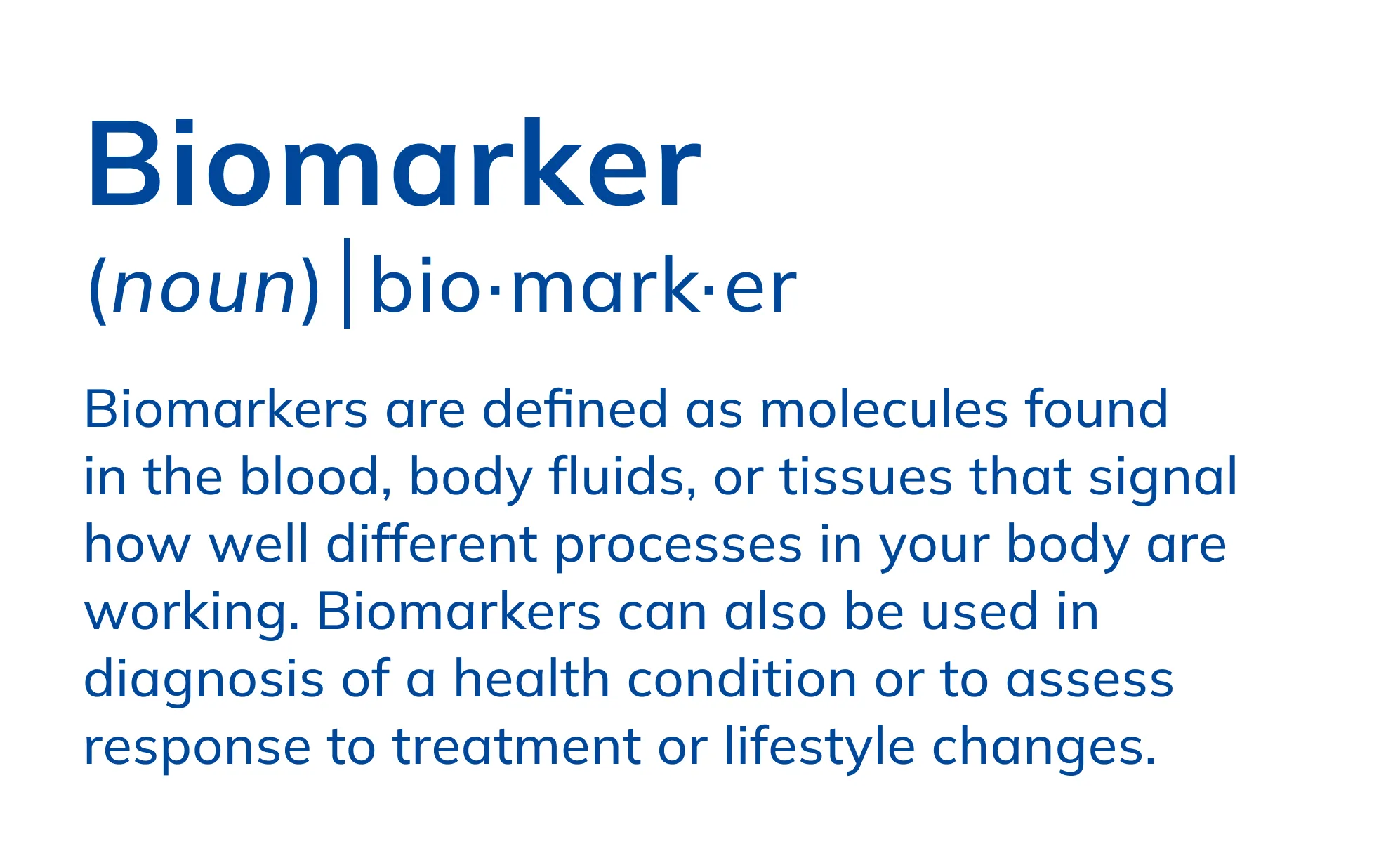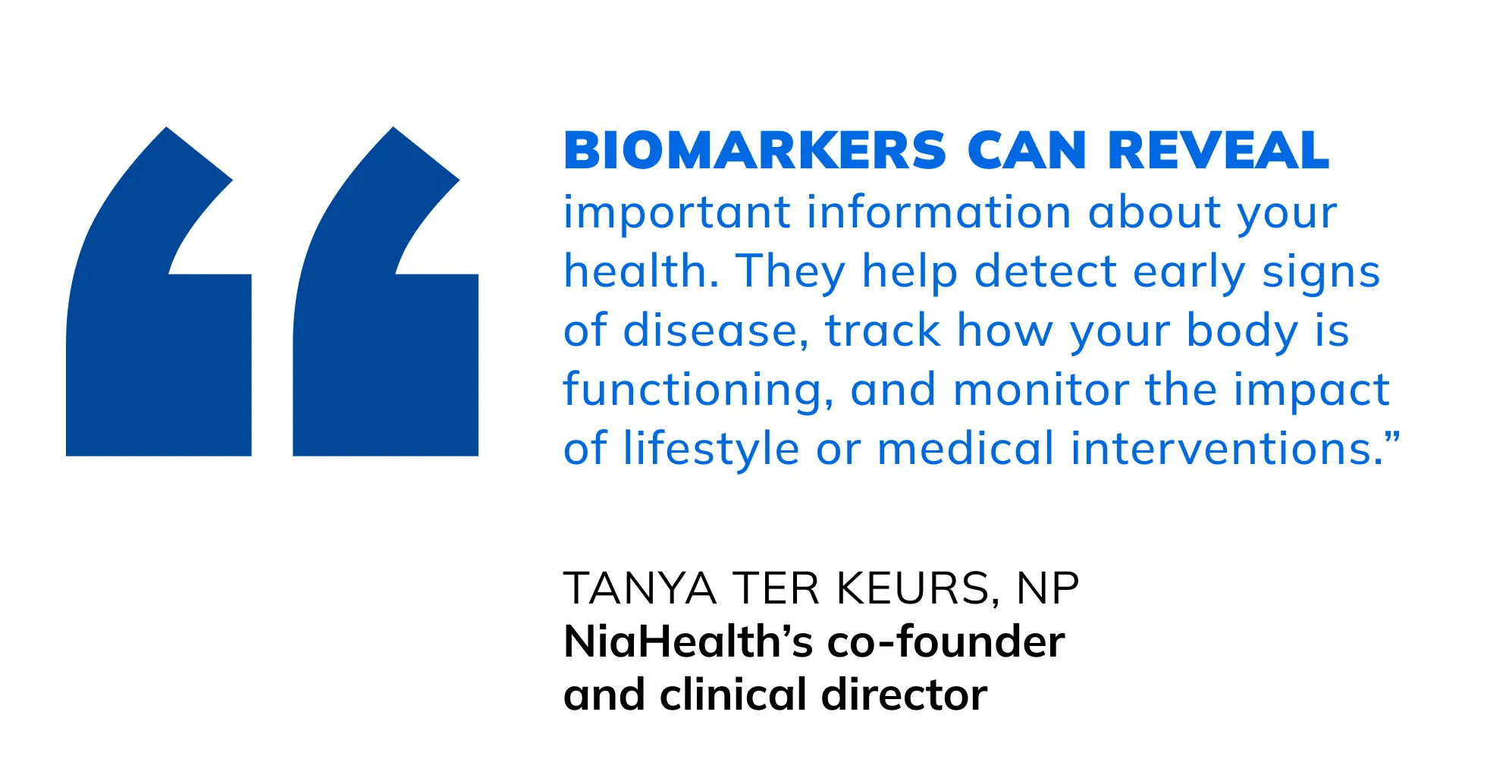Biomarkers: Complete Guide to Testing, Types, and Health Insights

Biomarker testing is one of the most powerful health tools to have at your disposal. This type of testing can assess hormones, metabolic health, and more. When tracked over time, biomarker testing can clue you into the state of your health, as well as provide information on how well treatments and lifestyle changes are working. Working with a knowledgeable clinician to provide guidance can help you create an actionable plan that could make a big difference for your future self.
Lab testing can track biomarkers, which include substances like hormones, genes, and metabolites that provide a deeper understanding of your health journey. For instance, you can track your blood sugar levels to get a sense of your risk of type 2 diabetes. Or you can look at your thyroid hormones to monitor thyroid disease. Following your biomarkers allow you to be in the driver’s seat when it comes to your own body.
Read on to learn more about what biomarkers are, why they matter, and how to use the results to better your health.
What exactly are biomarkers?
Biomarkers are defined as molecules found in the blood, body fluids, or tissues that signal how well different processes in your body are working. Biomarkers can also be used in diagnosis of a health condition or to assess response to treatment or lifestyle changes.
“Biomarkers can reveal important information about your health. They help detect early signs of disease, track how your body is functioning, and monitor the impact of lifestyle or medical interventions,” says Tanya ter Keurs, Nurse Practitioner and NiaHealth’s Co-Founder and Clinical Director.
There are several different types of biomarkers that can be assessed via blood testing in a lab, including:
- Proteins
- Hormones
- Genes
- Metabolites
- Inflammatory markers

Why biomarkers matter
Biomarkers let you know what hormones or body systems are in need of attention and correction. A clinician can provide personalized recommendations to improve hormonal health, metabolic function, reduce inflammation, and more.
Ultimately, this can do three important things for your health today and in the future, says ter Keurs:
- Help you manage chronic conditions, such as diabetes, or reverse prediabetes.
- Identify early risks for chronic diseases such as heart disease, diabetes, osteoporosis and more.
- Optimize your wellness with actionable insights as to how you can move the needle on your day-to-day lifestyle choices.
Types of biomarkers you should understand
Although there are more than 100 biomarkers that can be assessed in the body, they fit into a few broad categories. Understanding biomarkers will help you prepare for your lab results.
Here are just a few types of biomarkers that offer invaluable insight for your health:
Diagnostic biomarkers
Diabetes can be diagnosed with an HbA1c test, which measures average blood sugar levels over the past three months. Thyroid function can be evaluated by analyzing thyroid hormone levels. Cholesterol numbers can be used to diagnose high cholesterol.
These are just a few examples of biomarkers that are used to diagnose disease. Regular biomarker testing can be used for early detection of diseases, often when they’re in their most treatable stage.
Predictive biomarkers
When being treated for disease, such as cancer, some predictive biomarkers may be analyzed to assess how likely you are to respond to specific treatments. With that, better personalized treatment recommendations can be made, increasing the likelihood of bringing the disease into remission, reversing or curing the condition, or better managing it.
Prognostic biomarkers
A prognostic biomarker provides clinician insight as to how likely a disease will progress or return. This may be used in cancer, for example. Breast cancer genes (BRCA) can indicate how likely a breast cancer is to return. Prostate-specific antigen (PSA) can be used to determine the likelihood of the cancer progressing.
Monitoring biomarkers
When you start treatment or make lifestyle changes, you want to know if they’ve made a difference. How you feel (more energy, less stress, easier to fall asleep at night, weight loss) all matter, but you want your numbers to reflect that, of course. You can use biomarker testing to monitor how well treatment and lifestyle changes have been working for you—and make tweaks based on follow-up results. One example is lipid testing where you can track your cholesterol and triglyceride levels, a measure of heart health. You can see how well diet changes (like adding more fiber or decreasing saturated fat consumption) or an increase in exercise have affected your numbers—and if more changes are needed.

How biomarker testing has evolved
Biomarker testing has transformed dramatically over the past decade. What once required multiple doctor visits and sometimes weeks of waiting can now be done from home, with comprehensive panels testing dozens of markers simultaneously.
The real breakthrough isn't just convenience—it's accessibility. Advanced testing once limited to research institutions is now available to anyone curious about their health. At-home testing with trusted partners (NiaHealth can send someone straight to your home in 3 days!) can remove geographical barriers, while improved lab technologies have made testing more accurate and comprehensive.
"Understanding what your tests mean, and tracking them over time, can be a powerful tool for understanding your health better and staying accountable," says ter Keurs. "The key to improving health is slightly different for everyone, having an individualized, sustainable plan curated by health care providers is key to support you in this process."
Most importantly, the focus has shifted from exclusively diagnosing disease to understanding wellness—helping people optimize their health before problems arise.
The most important biomarkers for optimal health
If you’ve ever looked at the results of a blood test, you know there is a ton of data given to you. Some of the biomarkers will be particularly useful to you in understanding your health.
These include:
Metabolic and heart biomarkers
Metabolic biomarkers are an indicator of your risk for metabolic syndrome, a cluster of conditions that increase your risk of heart disease, stroke, and type 2 diabetes.
Biomarkers to pay attention to:
- Blood glucose: Higher-than-normal blood glucose levels indicate prediabetes or diabetes. Diabetes can be diagnosed if your fasting blood glucose test is 7.0 mmol/L or above or your A1C is 6.5% or greater.
- Insulin: Insulin is critical for your metabolic health because it is the hormone made by the pancreas that pushes blood sugar from your bloodstream into your cells where it can be used for energy. Measuring insulin levels can help identify health issues such as insulin resistance, an early sign of diabetes.
- Lipid profile: A blood test can reveal blood cholesterol levels, including triglycerides, unhealthy LDL cholesterol, and heart-protective HDL cholesterol levels.
Inflammation biomarkers
Inflammation is a normal body process—it’s what your body kicks up to fight a virus or help heal a cut on your skin (and more). When inflammation persists for a long period of time (called chronic inflammation), it’s damaging to the body, putting you at risk for chronic diseases such as diabetes, heart disease, arthritis, and more.
Blood tests can reveal levels of certain important biomarkers that are indicative of the amount of inflammation in your body:
- C-reactive protein (CRP): CRP is a protein your body makes in response to inflammation.
- Ferritin: while ferritin is often associated with iron stores, it is also a marker of inflammation in specific circumstances.
Hormonal biomarkers
Hormones are chemical messengers in your body, essentially instructing your body on what to do. There are more than 50 hormones in the human body. All are, of course, important to your body’s inner workings, but there are a few we give particular attention to:
- Thyroid hormones: Your thyroid is a butterfly-shaped gland at the base of your neck. Thyroid hormones affect your heart rate, blood vessels, metabolic rate, respiratory rate, bone growth, nervous system function, and reproductive health.
- Sex hormones: Blood testing can reveal levels of total and free testosterone, sex hormone-binding globulin (SHBG), luteinizing hormone (LH), follicle-stimulating hormone (FSH), estradiol (estrogen), B-HCG, and progesterone. The right levels for you depends on factors like sex and age.
Genetic and genomic biomarkers
Certain blood markers are associated with inherited risks or disease predispositions. This is often used for cancer diagnosis, treatment, or to detect future risks.
How to interpret your biomarker test results
Information is power—but when you have a list of 60 or 100 biomarkers on your test results (the results you receive from NiaHealth biomarker tests), you’ll benefit from expert guidance on interpreting those. Here’s what you’ll do:
- Receive your biomarker results: Feel free to look them over. Jot down notes or questions on specific things you’d like to review or revisit with your clinician.
- Connect with your clinician: As ter Keurs points out, “It’s important not to interpret your results in isolation. Working with a trained provider ensures you understand what the numbers mean for your health—and helps you build a smart, personalized plan.” Risks of interpreting these results yourself include misunderstanding what your numbers mean, which can create unnecessary worry and anxiety.
- Build your plan: Together with your clinician, create personalized health recommendations. Doing so as a partnership is important because it allows you to hone in on the practical changes that are most doable for you based on your life and preferences.
Using biomarkers to personalize your health journey
The best part about biomarker testing is being able to use data to take actionable steps.
“Biomarker data can guide specific decisions—like which supplements to take, whether to cut back on sugar or increase fiber, or how to adjust your workouts,” says ter Keurs.
Here’s how to connect the dots between your lab results and the next steps you can take to improve your health.
- Identify targeted biomarkers. If there are many biomarkers that are in consideration, talk to your clinician about what to focus on first and why.
- Discuss actionable lifestyle changes. You can use biomarker results to identify actionable changes to your diet, physical activity, sleep, stress, and supplement routine, among other things. Even better: many lifestyle changes can affect multiple biomarkers in positive ways. For example: Resistance exercise has been shown to lower A1C, improve insulin sensitivity, boost “good” HDL cholesterol numbers, decrease inflammatory markers, improve liver function, among other benefits.
- Ask about additional testing. In certain instances, your clinician might recommend further testing. For example, if there are concerns about your thyroid health, they may recommend a thyroid antibody test to identify a possible autoimmune thyroid disorder.
- Plan for retesting. Based on your goals and targets, your clinician should give you a timeline for follow-up testing, what will be tested, and provide insight into the long-term goals and plan for your health.
The bottom line
Biomarker testing is a powerful tool for understanding your health. When you have access to comprehensive data about how your body is functioning, you're better equipped to make informed decisions about your wellness—whether you're addressing specific symptoms or simply working to feel your best.
The real value lies not just in the numbers themselves, but in having the support to interpret what they mean for your unique situation. At NiaHealth, we believe that comprehensive biomarker testing is most effective when paired with clinical guidance that helps you understand your results and translate them into actionable steps.
Our approach combines extensive testing capabilities with personalized support from healthcare providers who specialize in biomarker analysis. Whether you're managing a specific health concern or looking to optimize how you feel, we're here to help you make sense of your data and create a plan that works for your life.
If you're ready to take a deeper look at your health, we'd be honored to support you on that journey through comprehensive biomarker testing and personalized clinical guidance.
Key takeaways
- Biomarkers are molecules in the body that paint a picture of your overall health. Targeted biomarker testing can show very early signs of disease, help you monitor and manage chronic conditions, and help you identify the best lifestyle changes to make for better health.
- Interpreting your results should be done under the guidance and support of a trained clinician, who can make personalized recommendations for your next steps.
- NiaHealth can test for over 100 biomarkers—and then work with you to interpret your results— so you have a thorough understanding of your overall health, and what steps to take next.
Frequently asked questions
What is an example of a biomarker?
One example of a biomarker is TSH (thyroid-stimulating hormone). TSH regulates thyroid function. An abnormal TSH level can indicate hyperthyroidism (overactive thyroid) or hypothyroidism (underactive thyroid).
What are the 4 types of biomarkers?
The four main types of biomarkers are diagnostic biomarkers (used to detect and diagnose disease), predictive biomarkers (assess how likely you are to respond to specific treatments), prognostic biomarkers (predict disease outcomes and progression), and monitoring biomarkers (track ongoing health and treatment efficacy over time).
What are the most common biomarkers?
Common biomarkers include HbA1c (for blood sugar), cholesterol and triglycerides, thyroid hormones, inflammatory markers, and sex hormones.
What can biomarkers tell you?
Biomarkers can provide a range of information based on how they’re used. Some are used to detect and diagnose disease, assess how likely you are to respond to treatment, predict disease progression, and track treatment and lifestyle change efficacy over time.
What is the purpose of a biomarker?
By assessing multiple biomarkers in the context of your individual story, a clinician can have a full view of a client’s health.
Our editorial standards & process
At NiaHealth, our mission is to make proactive health possible for all Canadians—by combining science with humanity. We believe that rigorous, evidence-informed health information should never feel out of reach. Every word we publish is intentional. We choose language that empowers rather than overwhelms, clarifies rather than complicates, and respects the lived experiences behind every health question. Learn more here.


.webp)